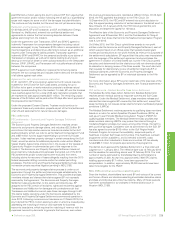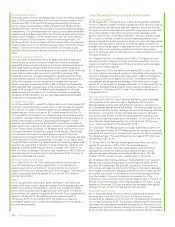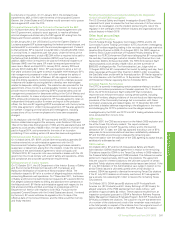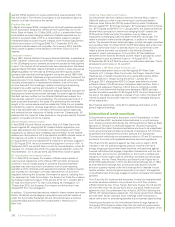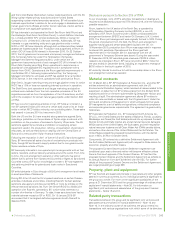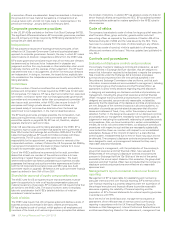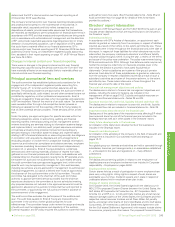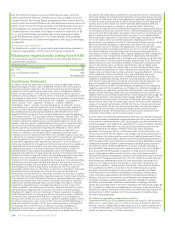BP 2015 Annual Report Download - page 253
Download and view the complete annual report
Please find page 253 of the 2015 BP annual report below. You can navigate through the pages in the report by either clicking on the pages listed below, or by using the keyword search tool below to find specific information within the annual report.
in respect of any particular dividend, cash will be paid automatically
instead.
Future dividends will be dependent on future earnings, the financial
condition of the group, the Risk factors set out on page 53 and other
matters that may affect the business of the group set out in Our strategy
on page 13 and in Liquidity and capital resources on page 219.
The following table shows dividends announced and paid by the
company per ADS for the past five years.
Dividends per ADSaMarch June September December Total
2011 UK pence 26.02 25.68 25.90 26.82 104.42
US cents 42 42 42 42 168
2012 UK pence 30.57 30.90 30.10 33.53 125.10
US cents 48 48 48 54 198
2013 UK pence 36.01 35.01 34.58 34.80 140.40
US cents 54 54 54 57 219
2014 UK pence 34.24 34.84 35.76 38.26 143.10
US cents 57 58.5 58.5 60 234
2015 UK pence 40.00 39.18 39.29 39.81 158.28
US cents 60 60 60 60 240
aDividends announced and paid by the company on ordinary and preference shares are provided
in Financial statements – Note 9.
UK foreign exchange controls on dividends
There are currently no UK foreign exchange controls or restrictions on
remittances of dividends on the ordinary shares or on the conduct of the
company’s operations, other than restrictions applicable to certain
countries and persons subject to EU economic sanctions or those
sanctions adopted by the UK government which implement resolutions
of the Security Council of the United Nations.
Shareholder taxation information
This section describes the material US federal income tax and UK
taxation consequences of owning ordinary shares or ADSs to a US holder
who holds the ordinary shares or ADSs as capital assets for tax purposes.
It does not apply, however, inter alia to members of special classes of
holders some of which may be subject to other rules, including: tax-
exempt entities, life insurance companies, dealers in securities, traders in
securities that elect a mark-to-market method of accounting for securities
holdings, investors liable for alternative minimum tax, holders that,
directly or indirectly, hold 10% or more of the company’s voting stock,
holders that hold the shares or ADSs as part of a straddle or a hedging or
conversion transaction, holders that purchase or sell the shares or ADSs
as part of a wash sale for US federal income tax purposes, or holders
whose functional currency is not the US dollar. In addition, if a
partnership holds the shares or ADSs, the US federal income tax
treatment of a partner will generally depend on the status of the partner
and the tax treatment of the partnership and may not be described fully
below.
A US holder is any beneficial owner of ordinary shares or ADSs that is for
US federal income tax purposes (i) a citizen or resident of the US, (ii) a US
domestic corporation, (iii) an estate whose income is subject to US
federal income taxation regardless of its source, or (iv) a trust if a US
court can exercise primary supervision over the trust’s administration and
one or more US persons are authorized to control all substantial decisions
of the trust.
This section is based on the tax laws of the United States, including the
Internal Revenue Code of 1986, as amended, its legislative history,
existing and proposed US Treasury regulations thereunder, published
rulings and court decisions, and the taxation laws of the UK, all as
currently in effect, as well as the income tax convention between the US
and the UK that entered into force on 31 March 2003 (the ‘Treaty’). These
laws are subject to change, possibly on a retroactive basis. This section
further assumes that each obligation in the Deposit Agreement and any
related agreement will be performed in accordance with its terms.
For purposes of the Treaty and the estate and gift tax Convention (the
‘Estate Tax Convention’) and for US federal income tax and UK taxation
purposes, a holder of ADRs evidencing ADSs will be treated as the
owner of the company’s ordinary shares represented by those ADRs.
Exchanges of ordinary shares for ADRs and ADRs for ordinary shares
generally will not be subject to US federal income tax or to UK taxation
other than stamp duty or stamp duty reserve tax, as described below.
Investors should consult their own tax adviser regarding the US federal,
state and local, UK and other tax consequences of owning and disposing
of ordinary shares and ADSs in their particular circumstances, and in
particular whether they are eligible for the benefits of the Treaty in
respect of their investment in the shares or ADSs.
Taxation of dividends
UK taxation
Under current UK taxation law, no withholding tax will be deducted from
dividends paid by the company, including dividends paid to US holders.
A shareholder that is a company resident for tax purposes in the UK or
trading in the UK through a permanent establishment generally will not
be taxable in the UK on a dividend it receives from the company. A
shareholder who is an individual resident for tax purposes in the UK is
subject to UK tax but until 5 April 2016, is entitled to a tax credit on cash
dividends paid on ordinary shares or ADSs of the company equal to one-
ninth of the cash dividend.
US federal income taxation
A US holder is subject to US federal income taxation on the gross
amount of any dividend paid by the company out of its current or
accumulated earnings and profits (as determined for US federal income
tax purposes). Dividends paid to a non-corporate US holder that
constitute ‘qualified dividend income’ will be taxable to the holder at a
preferential rate, provided that the holder has a holding period in the
ordinary shares or ADSs of more than 60 days during the 121-day period
beginning 60 days before the ex-dividend date and meets other holding
period requirements. Dividends paid by the company with respect to the
ordinary shares or ADSs will generally be qualified dividend income.
For US federal income tax purposes, a dividend must be included in
income when the US holder, in the case of ordinary shares, or the
Depositary, in the case of ADSs, actually or constructively receives the
dividend and will not be eligible for the dividends-received deduction
generally allowed to US corporations in respect of dividends received
from other US corporations. US ADS holders should consult their own tax
advisor regarding the US tax treatment of the dividend fee in respect of
dividends. Dividends will be income from sources outside the US and
generally will be ‘passive category income’ or, in the case of certain US
holders, ‘general category income’, each of which is treated separately
for purposes of computing a US holder’s foreign tax credit limitation.
As noted above in UK taxation, a US holder will not be subject to UK
withholding tax. Accordingly, the receipt of a dividend will not entitle the
US holder to a foreign tax credit.
The amount of the dividend distribution on the ordinary shares that is paid
in pounds sterling will be the US dollar value of the pounds sterling
payments made, determined at the spot pounds sterling/US dollar rate on
the date the dividend distribution is includible in income, regardless of
whether the payment is, in fact, converted into US dollars. Generally, any
gain or loss resulting from currency exchange fluctuations during the
period from the date the pounds sterling dividend payment is includible in
income to the date the payment is converted into US dollars will be
treated as ordinary income or loss and will not be eligible for the
preferential tax rate on qualified dividend income. The gain or loss
generally will be income or loss from sources within the US for foreign
tax credit limitation purposes.
Distributions in excess of the company’s earnings and profits, as
determined for US federal income tax purposes, will be treated as a
return of capital to the extent of the US holder’s basis in the ordinary
shares or ADSs and thereafter as capital gain, subject to taxation as
described in Taxation of capital gains – US federal income taxation
section below.
In addition, the taxation of dividends may be subject to the rules for
passive foreign investment companies (PFIC), described below under
‘Taxation of capital gains – US federal income taxation’. Distributions
made by a PFIC do not constitute qualified dividend income and are not
eligible for the preferential tax rate applicable to such income.
BP Annual Report and Form 20-F 2015 249
Shareholder information


